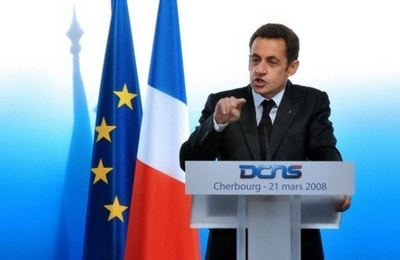France to send extra troops to Afghanistan
(Agencies)
Updated: 2008-03-23 12:50
Updated: 2008-03-23 12:50
PARIS - France is tipped to promise 1,000 extra troops for international forces fighting the Taliban in Afghanistan, as President Nicolas Sarkozy moves his country closer to its NATO allies ahead of a key summit.
 President Nicolas Sarkozy gives a speech in Cherbourt, France on March 21, 2008. France is tipped to promise 1,000 extra troops for international forces fighting the Taliban in Afghanistan, as Sarkozy moves his country closer to its NATO allies ahead of a key summit. [Agencies] |
If a decision is made, and possibly announced during the April 2-4 alliance meeting in Bucharest, the troops could leave for Afghanistan in the company of up to 200 special forces who would return to the war-torn country after leaving in January last year.
Several dozen French instructors are still on mission in Afghanistan.
No final decision on France's future involvement seems to have been taken, with a source in Paris saying that "talks with the allies continue up to the last moment".
The issue will also be discussed during talks between Sarkozy and British Prime Minister Gordon Brown when the French president visits London on Thursday and Friday.
In the meantime, French military experts were looking into possible scenarios for France's role in Afghanistan - from maintaining the status quo to the deployment of additional troops to the volatile south, alongside Canadian troops, 80 of whom have been killed since 2002.
France has already committed 2,200 troops to the region of which 1,500 are currently stationed in Afghanistan.
French military leaders are said to prefer a deployment in eastern Afghanistan, where insurgent attacks have tumbled, according to a US general, notably along the border with Pakistan, in recent months compared to the same period last year.
Under one scenario, French units in the Kabul area would gradually withdraw and hand over to Afghan government troops to replace US forces and spread out between the Afghan capital and the Pakistani border to the east.
French special forces are already familiar with the country's eastern regions.
This option is seen as being tactically and logistically coherent as it would create a link between French units in Kabul, instructors in the neighbouring provinces of Logar, Wardak and Kapissa and new units that would be deployed under US command.
A southern option - backing Canadian troops in the Kandahar area - would on the other hand leave French units scattered around larger areas, given the distances between the capital and the theatre of operations.
It would also mean that French troops are kept in the capital and French fighter aircraft at the NATO base in Kandahar, in addition to the deployment of fresh forces.
The deployment of a fifth batch of about 50 instructors in southern Oruzgan, alongside Dutch troops, would be upheld.
Washington, which has sent 3,200 more Marines to Afghanistan, has been putting pressure on European NATO allies to send more troops and equipment to fight the Taliban, particularly in the south where the rebels are most active.
There have also been calls by the NATO-led International Security Assistance Force for nations contributing to ISAF to send 7,500 more troops to help in the fight against the insurgency.
In early March the United States welcomed Sarkozy's long-term commitment to Afghanistan, laid out in a letter to its NATO allies.
US Acting Under Secretary of State for Political Affairs Dan Fried has also told the US Senate that Sarkozy was looking into the options of his country's future role in Afghanistan.
Since 2002, shortly after the start of the US-led invasion of Afghanistan to oust the Taliban, 13 French soldiers have died in accidents, fighting or bomb attacks.
|
|
|
||
|
||
|
|
|
|